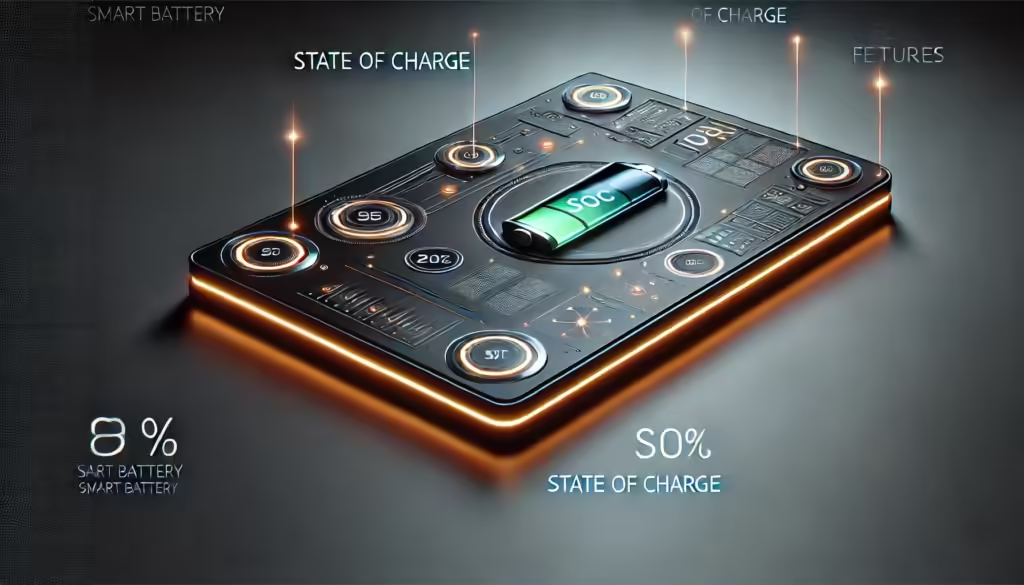Smart Batteries: The Future of UAVs
and Robotics Power
Smart Batteries: The Future of UAVs and Robotics Power

In recent years, the rapid advancement of technology has reshaped industries, with unmanned aerial vehicles (UAVs) and robotics leading the charge. These innovations have brought about exciting possibilities, but their success heavily relies on one crucial component: the battery. Enter smart batteries—a transformative solution poised to redefine power management for UAVs and robotics.
What are Smart Batteries?
A smart battery is far more than a standard energy source. Unlike traditional batteries, which primarily provide power without any feedback or data, smart batteries are equipped with built-in electronic circuits and sensors that monitor their performance in real-time. These batteries can measure parameters like state of charge (SOC), state of health (SOH), voltage, current, temperature, and even the depth of discharge (DOD).
This advanced functionality enables smart batteries to communicate crucial information to devices or operators, ensuring safe and optimal usage. For instance, they can warn users when they’re running low on power or identify potential issues like overheating, reducing the risk of damage or failure.
Key Features Of Smart Batteries:-
- Real-time monitoring of critical battery metrics
- Intelligent charging and discharging management
- Enhanced safety features
- Integration with other smart systems, such as UAV flight controllers or robotic control units.
Why Are Smart Batteries Important for UAVs and Robotics?
UAVs and robotics applications demand high performance, reliability, and safety. Traditional batteries, while functional, lack the capabilities to meet these increasing demands. Here’s why smart batteries have become essential:
Key Features Of Smart Batteries:-
1. Real-Time Monitoring:-
Smart batteries provide operators and systems with real-time insights into their performance. For UAV developers, this means knowing exactly how much flight time remains or when to land safely. For robotics, real-time monitoring ensures seamless operation without unexpected downtime.
2. Improved Efficiency:-
By optimizing charging and discharging cycles, smart batteries reduce energy waste and extend their lifespan. This is particularly valuable for robotics used in industrial automation, where efficiency translates directly into cost savings and higher productivity.
3. Enhanced Safety:-
With built-in protection mechanisms, smart batteries prevent overcharging, overheating, and short circuits. This is especially critical for UAVs operating in remote or hazardous environments, as it minimizes the risk of system failure or accidents.
4. Reliable Performance:-
Smart batteries maintain consistent output even under varying conditions. Whether it’s powering a surveillance drone in high-altitude regions or a robotic arm in a factory, these batteries ensure uninterrupted operations.
Future Trends in Smart Batteries for UAVs and Robotics:-
As industries evolve, so do their power needs. Here are some emerging trends shaping the future of smart batteries:
- Compact Power Solutions
- Advanced Data Analytics
- Integration with Communication
- Eco-Friendly Design
- Enhanced Compatibility
Lets understand each of these five terms with a little more brief :-

1. Higher Energy Density:-
Advancements in battery chemistry, such as solid-state technology, are leading to smaller, lighter batteries with increased energy density. This is crucial for UAVs that require longer flight times and robotics that need extended operational hours without frequent recharging.
2. Advanced Data Analytics:-
Future smart batteries will leverage AI and machine learning to predict performance trends and preemptively identify issues. This will enable predictive maintenance, reducing downtime and ensuring reliability.
3. Integration with IoT:-
The rise of the Internet of Things (IoT) is driving the need for interconnected systems. Smart batteries will seamlessly integrate with IoT networks, enabling centralized monitoring and control for fleets of UAVs or robotic systems.
4. Sustainability Focus:-
With a growing emphasis on sustainability, smart batteries are being designed to minimize environmental impact. Features like longer lifespans, recyclability, and energy-efficient operation are becoming standard.
5. Enhanced Compatibility:-
Manufacturers are focusing on universal compatibility, making smart batteries adaptable to various UAVs and robotic platforms. This reduces complexity for developers and increases adoption rates.
Conclusion
Smart batteries represent a significant leap forward in power management for UAVs and robotics. Their ability to provide real-time data, optimize performance, and enhance safety makes them indispensable for these applications. As technology continues to advance, the role of smart batteries will only grow, shaping the future of innovation in these sectors.
At Revogreen Technologies, we specialize in smart battery solutions tailored for UAVs and robotics. Our batteries combine cutting-edge technology with reliability to meet the most demanding requirements. Learn more about our smart battery solutions at Revogreen Technologies.


